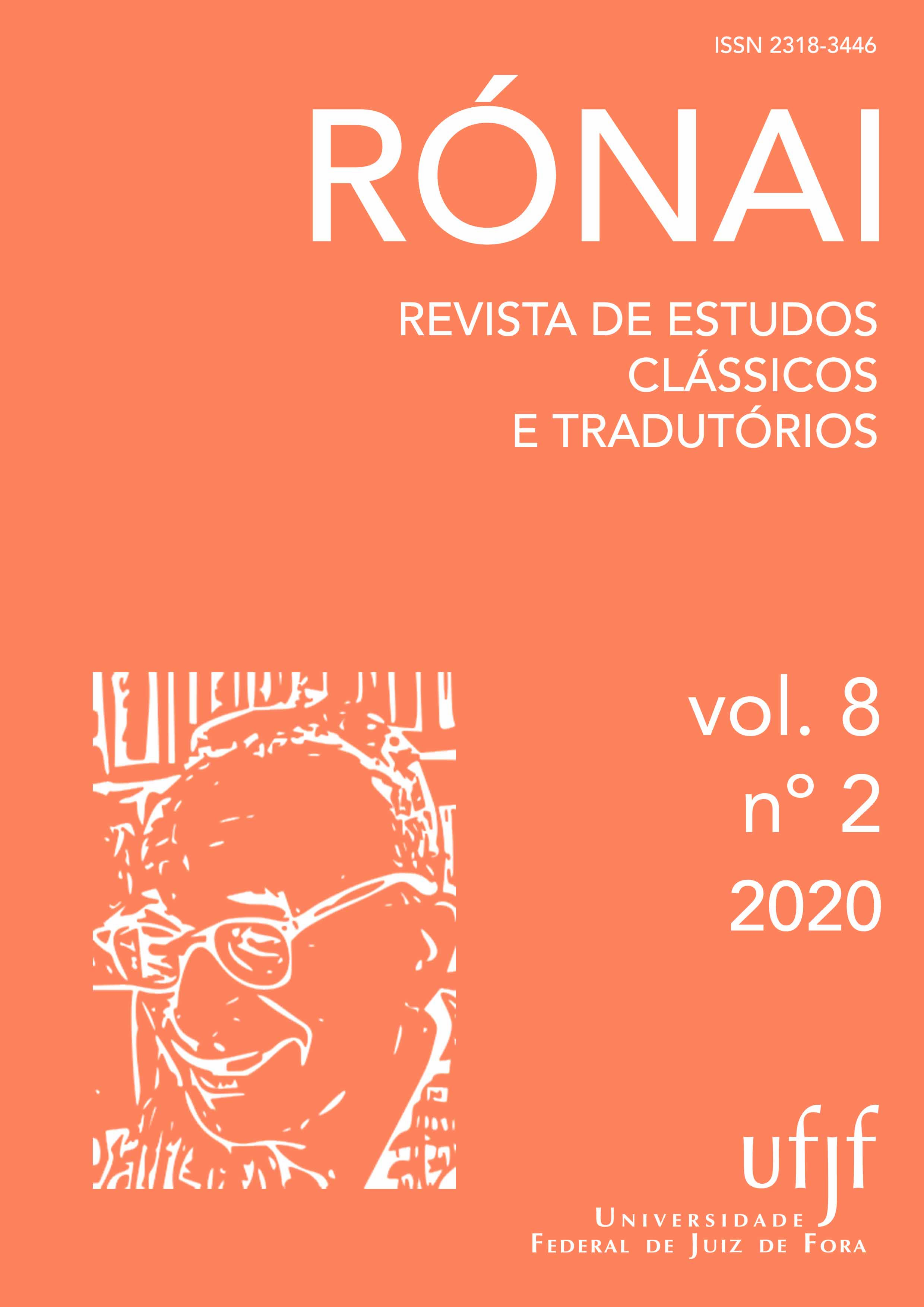Pyrrhonian language
DOI:
https://doi.org/10.34019/2318-3446.2020.v8.32363Palavras-chave:
Pirronismo, Diórgenes Laércio, Timón de Fliunte, catálogo épico, históriaResumo
This article characterises how the Pyrrhonian Sceptic uses language to test if such use is susceptible to Dogmatic criticisms, especially from a Stoic perspective. It will examine two characterisations of that use. The
first one, reported by Diogenes Laertius in his Lives of Eminent Philosophers 9.71-78, will be discussed as a logical use of human language broader than a philosophical one. The second characterisation depends on the discourse chosen by Timon of Phlius in his Silloi. In this work, the Epic catalogue shows itself as a powerful mechanism; it allows to report, to make history about philosophy itself and to offer an account of Pyrrho’s place in it without postulating substantive theses. This literary use and the previous philosophical
one constitute the particular uses of Pyrrhonian language.
Downloads
Referências
Primary sources
ARISTOTLE. On the Soul. Translated by J.A. Smith in The Completed Works of Aristotle Vol. 1. J. Barnes (Ed). Princeton: University Press, 1984.
ΔΙΟΓΕΝΟΥΣ ΛΑΕΡΤΙΟΥ ΠΥΡΡΩΝ ΚΑΙ ΤΙΜΩΝ. Text by Tiziano Dorandi andTranslation and Commentary by Elizabeth Scharffenberger and Katja Maria Vogt, in Pyrrhonian Scepticism in Diogenes Laertius. Vogt, K (ed). Tübingen: Mohr Siebeck, p. 16-71, 2015.
DIÓGENES LAERCIO IX, 61-116: Pirrón y los pirrónicos. Traducción y comentario. Traducción de Alfonso Correa Motta y Liliana Carolina Sánchez Castro. En: Ideas y Valores, Vol. LXII, nº 151, pp. 215-238, Abril de 2013.
DIOGENES LAERTIUS. Lives of Eminent Philosophers. Tiziano Dorandi (Edited). Cambridge Classical Texts and Commentaries. Cambridge University Press, 2013.
DIÓGENES LAERCIO. Vidas y opiniones de filósofos ilustres. Traducidas y comentadas por Luis-Andrés Bredlow. Barcelona: Editorial Lucina, 2010.
DIÓGENES LAERCIO. Vidas y opiniones de filósofos ilustres. Traducción introducción de Carlos García Gual. Madrid: Alianza, 2013.
TIMONE DI FLIUNTE. Silli. Introduzione, edizione critica, traduzione e commento. A cura di Massimo di Marco. Roma: Edizione dell’ Ateneo, 1989.
XENOPHON. Memorabilia. Translated and annotated by Amy L. Bonnette. With an Introduction by Christopher Bruell. Cornell University Press, 1994.
Secondary references
AUSTIN, John L. How to do Thing with Words. The William James Lectures delivered at Harvard University in 1955. Oxford: Clarendon Press, 1976.
BARNES, Jonathan. Pyrrhonism, Belief and Causation. Observations on the Scepticism of Sextus Empiricus, in Haase, W & Temporini, H. Aufstieg und Niedergang der Römischen Welt. Part II: Principate. Vol. 36.4, Berlin-New York, pp. 2608-2695, 1990.
BARNEY, Stephen. Chaucer’s Lists. In The Wisdom of Poetry, ed. D. Benson and S. Wenzel, pp. 189–223. Kalamazoo, 1982.
BETT, Richard. Timon of Phlius, The Stanford Encyclopedia of Philosophy (Winter 2014, Edition), Edward N. Zalta (ed.) URL= https://plato.stanford.edu/cgi-bin/encyclopaedia/archinfo.cgi?entry=timon-phlius, 2014.
BRUNSCHWIG, Jacques. Once again on Eusebius on Aristocles on Timon on Pyrrho. Papers on Hellenistic Philosophy. Trans Janet Lloyd. Cambridge University Press, 1994a.
_______. The title of Timon’s Indalmoi: from Odysseus to Pyrrho. Papers on Hellenistic Philosophy. Trans Janet Lloyd. Cambridge University Press, 1994b.
CAUJOLLE-ZASLAWSKY, F. La méthode des sceptiques grecs. Revue philosophique 2, p. 371-381, 1982.
CASTAGNOLI, Lucas. Ancient Self-Refutation. The logic and history of the Self-Refutation Argument from Democritus to Augustine. Cambridge University Press, 2010.
CHIESARA, MARIA LORENZA. Historia del escepticismo griego. Madrid: Ediciones Siruela, 2007.
CLAYMAN, Dee L. Timon of Phlius Pyrrhonist into Poetry. Berlin: Walter de Gruyter, 2009.
CORTI, Lorenzo. Scepticisme et language. Paris: Vrin, 2009.
_______ Mind and Language of the Laërtian Pyrrhonist: Diog. Laert. 9, 74-77. Pyrrhonian Skepticism in Diogenes Laertius. Vogt, K (ed). Mohr Siebeck, Tübingen, 2015.
DECLEVA CAIZZI, F. Pirroniani ed Accademici nel III Secolo A.C. Aspects de la philosophie hellénistique, Entretiens sur l’antiquité classique, tome XXXII. Vandoeuvres/ Genève, Fondation Hardt, p 147-183, 1986.
DESBORDES, F. Le langage sceptique. Notes sur le Contre les grammairiens de Sextus Empiricus. Langages 65, p. 47-74, 1982.
LIDDLE, Henry & SCOTT, Robert (LS) A Greek- English Lexicon. Revised Supplement by H. S. Jones y R. McKenzie. Oxford: Clarendon Press, 1996.
LONG, Anthony. A. Timon of Phlius: Pyrrhonist and Satirist. From Epicurus to Epictetus. Cambridge University Press, 2006.
MARCHAND, Stéphane. Sextus Empiricus’ Style of Writing. New Essays on Ancient Pyrrhonism, 2011.
MCPHERRAN, Mark. Skeptical Homeopathy and Self-Refutation. Phronesis. Vol. 32, Nº 3, pp. 290-328, 1987.
PREVETT, J.P & PREVETT, L.S. Egg Retrieval by Blue Geese. The Auk: Ornithological Advances. Vol. 90, Nº1, Jan, pp. 202-204, 1973.
SAMMONS, Benjamin. The Art and Rhetoric of the Homeric Catalogue. Oxford Scholarship, 2010.
SÁNCHEZ CASTRO, Liliana C. Traditio animae: la recepción aristotélica de las teorías presocráticas del alma. Bogotá: Universidad Nacional de Colombia, 2016.
SPINELLI, Emidio. Sceptics and Language: Phonai and Lógoi in Sextus Empiricus. Historie Epistemologie Language, tome 13 Fascicule 2, p. 57-70, 1991.
SPUFFORD, Francis. The Chatto Book of Cabbages and Kings: Lists in Literature. London: Chatto & Windus, 1989.
STOUGH, Charlotte. Sextus Empiricus on Non-assertion. Phronesis 29, p. 137-64, 1984.
TURRI, J. Pyrrhonian Skepticism Meets Speech-Act Theory. International Journal for the Study of Skepticism 2, p. 83-98, 2012.
VENDLER, Zeno. Linguistics in Philosophy. Ithaca, Cornell University Press, 1967.
VOGT, Katja. Skepsis und Lebenspraxis: Das Pyrrhonishe Leben ohne Meinungen. Alber Verlag, 1998.
Downloads
Publicado
Como Citar
Edição
Seção
Licença
Copyright (c) 2020 Andrea Lozano-Vásquez

Este trabalho está licenciado sob uma licença Creative Commons Attribution 4.0 International License.
Direitos Autorais
Autores que publicam nesta revista concordam com os seguintes termos:
1. Autores e autoras mantém os direitos autorais e concedem à revista o direito de primeira publicação, sendo a publicação licenciada sob a Creative Commons Attribution License 4.0 Internacional.
2. Os autores e autoras têm permissão e são estimulados(as) a publicar e compartilhar o trabalho com reconhecimento da publicação inicial nesta revista.
3. Os autores e autoras dos trabalhos aprovados autorizam a revista a ceder o conteúdo de seus trabalhos, após sua publicação, para reprodução em indexadores de conteúdo, bibliotecas virtuais e similares.
Para mais informações sobre a Creative Commons Attribution 4.0 International License, acessar: https://creativecommons.org/licenses/by/4.0/
Isenção editorial
O conteúdo dos artigos publicados é de inteira e exclusiva responsabilidade de seus autores, não representando a posição oficial da Rónai - Revista de Estudos Clássicos e Literários ou do Faculdade de Letras da Universidade Federal de Juiz de Fora ou das instituições parceiras.



